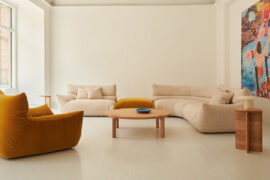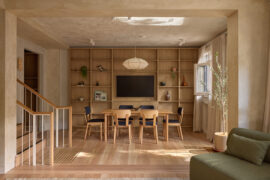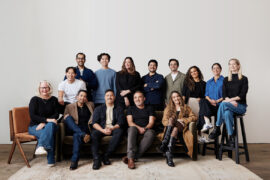Dowel Jones is ten years young this year and the future is bright for the Australian furniture designers and manufacturers.

August 29th, 2024
It’s a milestone in anyone’s book and a ten-year anniversary is to be celebrated. For Dowel Jones, the journey from small beginnings to a major international furniture designer and maker has been unintentionally meteoritic but it has certainly established its place in the landscape of Australian design.
On Friday 26th July 2024, Dowel Jones launched an exhibition titled Ten Years of Dowel Jones in Geelong, its homebase. The exhibition will run until 24th November and is on display at the National Wool Museum in Geelong.
Ten Years of Dowel Jones is a retrospective as well as a glimpse of the future. The launch evening was attended by a capacity crowd of architects, designers, collaborators and supporters who paid tribute to the success, perseverance and resilience of Dowel Jones’ and its co-founders Dale Hardiman and Adam Lynch.

While the business is a major success story, there is another that sees Hardiman and Lynch as protagonists in the Melbourne design scene and their successes as encouragement to others who would like to emulate their actions.
Further to this, Hardiman, in particular, is a powerhouse of, and for, design. He is constantly planning and executing new ideas to bring the unique talent of object makers to a greater and more diverse audience. Through countless exhibitions and installations over the years there has been a nurturing of talent both emerging and well-known, a collegiate gathering of like-minded designers and makers that has been unified and supported not only by Dowel Jones but Hardiman himself.
While involvement in the Melbourne design community is a constant, the most remarkable aspect of Dowel Jones is its prowess to constantly design and develop incredibly successful products in a very competitive market.

Delving into the underbelly of Dowel Jones, we ask just what does it take to conceive a business, establish it, stay the distance and prosper. Well, the answer is: to be authentic, go with the flow and enjoy it. There was no grand idea to make a business or a strategic plan in place for Hardiman and Lynch at the beginning of their great adventure. Instead, Dowel Jones has grown organically.
The two men met while studying furniture design at RMIT and collaborated to create Mr Dowel Jones, a desk and floor lamp, their very first product. To the pair’s delight, it sold exceptionally well and the capital from sales enabled them to then design another product, then another. This is how the business began.

At only 19 and 21 years old, with little fear of risk and a challenging jobs market at the time – and as long as there was money coming in from sales to cover the rent of the factory and personal accommodation – then life was good. Over the years this relaxed commitment to design has paid stress free dividends and the business has simply grown and grown.
At the core of Dowel Jones is the commitment to sustainable development, morality and ethical behaviour that drives the designers and their business. Design for Dowel Jones is about authenticity, and it is this which has provided success and longevity.
Hardiman says: “This has been discussed many times over the years, and I think it’s because what we do, we know to be ethical and moral. So, we’re focusing on Australian manufacturing, we’re not interested in being one of the biggest brands in the world. It’s not growth at all costs. It’s really about how do we create a sustainable brand, which we can do for the next 50-something years, while also actually having an enjoyable time at work every day.”

With Lynch working between Melbourne and Geelong (and the factory) and Hardiman located in the Fitzroy showroom, there is a broad division of responsibility. Both men are on the same page but follow different paths. Perhaps you could say that Lynch concentrates on the manufacturing heart while Hardiman ensures that everything else works and is the bloodstream.
“Adam’s always been interested in the making side to the business and design and so I’m guessing he could see that there’d be potential to build a business. I mean, he’s always been far more future thinking than I have. I work pretty short term in my thinking, as I think about the next project or the next few months, whereas he’s much more of a future thinker. So maybe he saw the vision that this could be a sustainable business.”
Hardiman continues: “For me, it was really just about having a good time. We had enough money to live and we had no real desire to be rich or to sell millions of products, there was never any interest in over-consumption and saturation. Even to this day, I’m still so pleased when someone buys just one chair for their house and I’m so proud they own something we designed and made locally.”
Of note is Dowel Jones’ amazing Instagram account. Consistent posting has brought more than 106,000 followers, who interact with the account through myriad quirky posts that, more often than not, don’t include furniture. It’s marketing genius and an unintended and brilliant move to connect that, to this day, just happens and is not a strategic plan.

Instagram has, however, played an important role in expanding the business as Hardiman reflects: “When we were first contacted in 2017 by our manufacturer based in the US, it came through the fact that we had a really strong social media presence and brand, and they could see that what we were doing was quite interesting. I think they were looking for external designers to represent their products and so we were the best case of an Australian brand that they could manufacture in the US. And so, they contacted us through social media, which is really quite something to think about because now they produce thousands of units a year of our product in America. Their Head of Marketing started a conversation with me on Instagram, and then I think it must have been within six to eight months, contracts were signed, and we were flying over to Michigan to discuss sampling! It really was as simple and uncomplicated as a message on Instagram through to manufacturing in the US.”
While the business expands, another nine collections were released at the end of July, and much of the supply chain is outsourced and they take their time to develop collections. With a small tight team of just six people, Dowel Jones is able to pivot quickly, change and adapt. However, Hardiman, Lynch and the team are at heart involved with traditional manufacturing which can’t be replaced by AI (at present).
So, it’s clear that authenticity is the key to success and promotes a more stress-free environment for Dowel Jones. If this is what the last 10 years have created, then think what’s in store for the next 10. Rest assured, Hardiman and Lynch are not standing still but building on the past, enjoying the present and designing for a better future.
And if you happen to be in Geelong within the next five months then pop into the exhibition to see the fruits of Dowel Jones’ labour. It will certainly open your eyes to great design, it’s a wonderful success story and it certainly should be celebrated. Congratulations Dowel Jones!
Dowel Jones
doweljones.com
Photography
Cricket Studio





INDESIGN is on instagram
Follow @indesignlive
A searchable and comprehensive guide for specifying leading products and their suppliers
Keep up to date with the latest and greatest from our industry BFF's!

A curated exhibition in Frederiksstaden captures the spirit of Australian design

Merging residential living with the retail experience, the latest project from In Addition breathes new life into shopping for the home.

CPD Live returns for its final live-presented season of 2025, bringing architects, designers, and specifiers a free opportunity to earn CPD points before the year ends. Kicking off at 9 AM AEDT, This Tuesday 14th October.
The internet never sleeps! Here's the stuff you might have missed

Sydney-based architecture studio Studio Johnston has announced a series of leadership promotions, new team members and a refreshed parental leave policy.